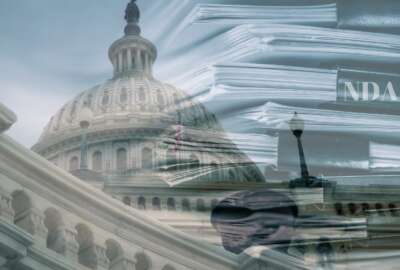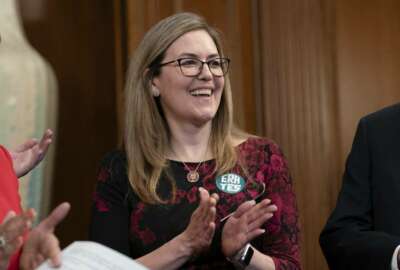
Annual leave will be easily restored for ‘essential’ employees during pandemic, OPM says
New regulations from the Office of Personnel Management, effective Monday, detail how "essential" federal employees can hold on to the annual leave they'd other...
Certain federal employees whose service has been deemed “essential” during the ongoing pandemic will be allowed to hold on to the annual leave they’d otherwise have to forfeit, the Office of Personnel Management announced Friday in a sweeping new regulation.
The interim final rule details how agencies can restore annual leave for certain federal employees working through this pandemic, as well as future national emergencies.
The new regulations go into effect Monday, as OPM waived the usual notice and comment requirements in an effort to “minimize harm and disruption to employees, agencies and payroll providers” — and give employees the chance to use these new provisions as soon as possible.
Under current statute, most federal employees can carry up to 30 days of leave to the following year, though some can accrue more. Any accrued leave that exceeds the statutory limit is usually lost.
But agencies can restore “use or lose” leave under certain circumstances, such as an administrative error, employee sickness or an “exigency of the public business.” This occurs when “there is a pressing need for an employee’s service, and the employee cannot use his or her excess annual leave because there are no other practical alternatives available to accomplish the work by a given deadline,” OPM said.
For the purposes of restoring annual leave, OPM has deemed the ongoing coronavirus pandemic as an “exigency of the public business.”
“Because of the unprecedented outbreak and spread of this virus and the efforts toward response and recovery, many federal agencies and employees have been, and for the foreseeable future will continue to be, engaged in work vital to our nation and to the pandemic response,” OPM said.
These employees who have annual leave balances that exceed the usual statutory carryover limit will be allowed to “schedule” that excess leave and therefore have it restored in a separate leave account for later.
“Essential” employees in these circumstances no longer need to schedule annual leave in writing before the start of the third biweekly pay period before the end of the year during the emergency, OPM said.
Full-time employees have until the end of the leave year in progress, that’s two years after the date of the end of the exigency of the public business, to use 416 hours or less of restored annual leave, OPM said. Agencies should extend that period by a year for each additional 208 hours of excess leave.
In issuing these regulations for the current pandemic, OPM is drawing on past practices from the aftermath of the Sept. 11, 2001, terrorist attacks and the “Year 2000 computer conversion efforts,” otherwise known as Y2K.
OPM had issued separate regulations for each of these events, both times allowing employees whose service was necessary during these emergencies to carry over annual leave they’d otherwise have to forfeit at the end of the year.
But moving forward, OPM will allow federal agencies to restore forfeited annual leave to their employees during the current health crisis — and future national emergencies that have been declared as such by the president.
Issuing this general regulation will allow OPM to respond more quickly to future emergencies and avoid the usual, lengthy rulemaking process, the agency said.
“For those emergencies that qualify under such circumstances, this generally applicable regulation will provide agencies with flexibility to permit restoration of annual leave expeditiously,” OPM said. “The OPM director expects to make a determination pursuant to these regulations when a certain national emergency as declared by the president will require the service of federal employees on a large scale, such that employees will be unable to use annual leave to prevent forfeiture of the leave. Only when the director of OPM makes such a determination and provides notice to agencies of such determination may agencies use the authority.”
OPM’s new regulations require agency heads to develop procedures for implementing this annual leave restoration policy as part of their emergency planning exercises. Again, OPM wants agencies to be ready to act as soon as an applicable national emergency has been declared.
Once one has been declared, agency heads should determine which employees are considered “essential” for a particular emergency and inform them of the determination.
OPM leaves it up to each agency to determine who exactly should be considered “essential” during this emergency and others, and who, therefore, should be eligible for annual leave restoration.
It’s also up to each agency to determine when the exigency of the public business should end for each employee or group of workers.
In general, the exigency of the public business should end a year after the start date of the national emergency, OPM said, though agencies can extend it for up to three years.
OPM did, however, acknowledge that each emergency will have a different impact on the federal workforce.
The Sept. 11 attacks, for example, relied on the essential services of federal intelligence analysts. For the current pandemic, “the services of employees such as physicians, nurses, certain clinical laboratory scientists and public health specialists may be more likely to be designated as essential to the emergency response,” OPM said.
As OPM detailed in June guidance, this new annual leave restoration policy is only meant for certain employees with certain responsibilities during this pandemic.
Federal employees who, for example, called off a week-long trip abroad and then canceled their vacation time won’t be allowed to restore annual leave under OPM’s forthcoming regulations.
Though OPM has clearly recognized the need for some sort of new annual leave restoration policy, Congress also had its eye on the challenge.
In standalone legislation and later in an amendment to the House version of the annual defense authorization bill, Rep. Jennifer Wexton (D-Va.) had outlined a similar annual leave restoration policy for essential federal employees during the pandemic.
Her amendment made it into the House bill, which members passed last month.
Copyright © 2024 Federal News Network. All rights reserved. This website is not intended for users located within the European Economic Area.
Nicole Ogrysko is a reporter for Federal News Network focusing on the federal workforce and federal pay and benefits.
Follow @nogryskoWFED





